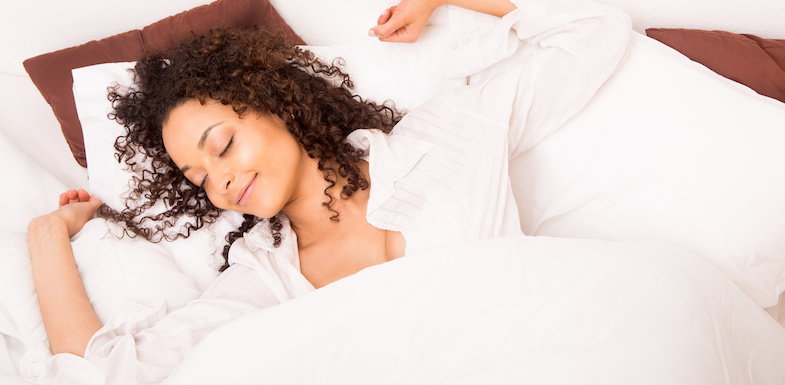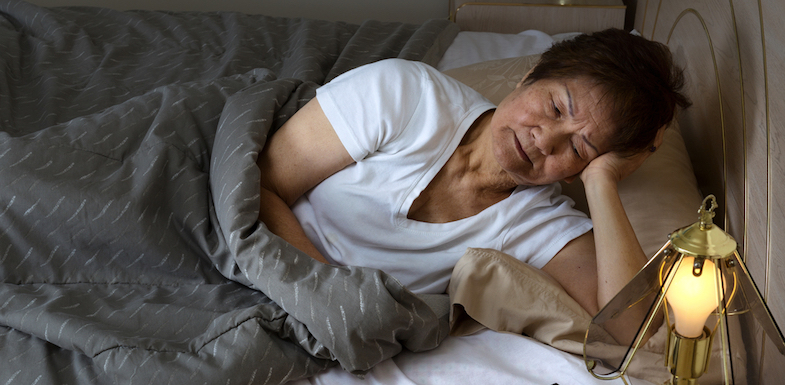We all know that lack of sleep can make us feel a little off the next day. Groggy, unable to concentrate, and irritable: these are all sure indications of too little sleep (or sleep of poor quality). While the occasional night of tossing and turning is common for most people, too many sleepless night strung together could indicate a more serious issue. It can lead to even more chronic pain the next day, leading to even less sleep the next. Sleep and mental health are also connected, with one feeding off the other. More and more research is pointing out that not enough sleep can be damaging to your health. Here’s how to get more sleep in order to decrease your pain.
What does a “normal” night of sleep look like?
You’ve heard that you need eight hours of sleep a night, right? While this is a reasonable rule of thumb, it isn’t exact. Everyone’s personal body clock is different and some people need more than eight while others can function on less. However, if at any time during the day you feel sleepiness affecting your ability to work or function, you are not getting enough sleep.
Without enough sleep you may find yourself impaired much like a person who has consumed too much alcohol. It can be detrimental for day to day activities as well as driving, which can lead to dangerous situations on the road. Eventually, not having enough sleep can cause sleep deprivation, which contributes to long-term health problems. In fact, sleeping produces a neurotransmitter called serotonin that regulates the body’s pain responses, anxiety, and depression.
A typical sleeper cycles through many 90-minute sleep cycles every night. These are divided into two stages that aren’t always equal in length.
Stage 1: Quiet sleep
During this stage, the sleeper begins to move into deep relaxation. Body temperature drops, breathing slows, and muscles begin to release and relax. Heart rate drops. At the very deepest part of this stage, the immune system gets a physiological boost.
Stage 2: Rapid eye movement (REM) sleep
This is the stage during which people dream. In parts of this stage, the body’s vital signs are nearly similar to when people are awake. Periods of REM sleep enhance learning and cognition and contribute to emotional health.
How much sleep do you need?
Contrary to what we might have heard from our parents, not everyone needs a solid eight hours of shut-eye to function well. In fact, the amount of sleep that people need varies widely not only depending on age but also within each age group.
The National Sleep Foundation has recommended sleep durations based on age and physiology. However, the organization also recognizes there will likely be some variation among individuals. Their recommended sleep hours are:
- 14 to 17 hours a day for newborns until three months
- 12 to 15 hours for infants to 11 months old
- 11 to 14 hours for toddlers from one to two years of age
- Preschoolers from three to five years should get ten to 13 hours
- School age children from six to 13 need nine to 11 hours of sleep
- Eight to ten hours is recommended for teenagers
- Younger adults from 18 to 25 should get seven to nine hours
- Adults between the ages of 25 and 64 still need between seven to nine hours
- Seven to eight hours is best for adults 65 or older
Within each group, actual required amounts may vary depending on activity level and any underlying health issues.
The importance of sleep
Restful sleep influences many functions within our bodies. It regulates the immune system to fight off infections and diseases. Sleep also helps to build a healthy cardiovascular system, along with exercise. It helps regulate our mood so we can avoid irritability or memory problems. Quality sleep can even fend off depression. Sleep is also an essential part of your body’s metabolism and is necessary for weight control.
Avoiding cellular damage
In 2014, the Medical College of Wisconsin published their findings that a lack of sleep affects our bodies on a cellular level. Researchers learned that sleep deprivation causes damage to our cells. The damage was most common in the liver, lung, and small intestine.
However, recovery sleep heals the damage. While it has long been understood that sleep affects our overall health this study helps make a more concrete connection between sleep deprivation and conditions like cardiovascular disease and cancer.
Promoting bone health
Sleep affects our bone health as well. In a Journal of Bone and Mineral Research review, experts discovered that sleep apnea may be one cause of osteoporosis. Sleep apnea affects a patient’s sleep duration, quality, breathing, and inflammation. Getting enough or too little rest affects the natural metabolism of our bone.
Improving long-term mental health
What is certain and common across all groups is that sleep and mental health are closely connected. This is a connection that begins in childhood. According to a study from the Norwegian University of Science and Technology (NTNU), approximately 20% of toddlers have serious sleep disorders that increase their risk of developing psychiatric disorders by age six. Researchers found that the reverse of this was also true: toddlers with psychiatric disorders at four were at a higher risk of developing sleep disorders by the age of six.
Silje Steinsbekk, an associate professor and psychologist in NTNU’s department of psychology, emphasized the importance of early identification of poor sleep for early interventions, noting:
“It is common for children to have periods when they sleep poorly, but for some children, the problems are so extensive that they constitute a sleep disorder. Our research shows that it is important to identify children with sleep disorders, so that remedial measures can be taken. Sleeping badly or too little affects a child’s day-to-day functioning, but we are seeing that there are also long term repercussions.”
Understanding sleep and depression
This chicken-and-egg puzzle of whether or not sleep disorders lead to mental health issues or vice versa has been puzzling researchers for 20 years. Insomnia used to be listed as a symptom of several mental health issues, including depression, anxiety, and bipolar disorder. Indeed, some studies have found that between 65 and 90% of adults with depression (and 90% of children) have a sleep disorder (usually insomnia).
But this lack of sleep can also increase the risk of developing depression. Three longitudinal studies – one involving adults ages 21 to 30 and the other two involving teens – found that study participants who reported insomnia were four times as likely to develop depression. In the case of the teens, sleep problems developed before depression did.
On the other hand, lack of sleep makes patients less likely to respond to treatment for depression. Insomnia also increases the chance of relapse and increases the chances of a depressed patient thinking about or attempting suicide.
For people with mental illness, the connection between sleep and mental health cannot be ignored. Struggling with a mood disorder is hard enough when your body hasn’t had adequate rest. Further, those with chronic pain are already at higher risk for developing mental health conditions, like depression and anxiety.
How to get more sleep
How can you make sure you’re getting enough sleep? If you are experiencing a period of acute insomnia, lasting two weeks or less, the best thing to do is to try to improve your sleep hygiene and wait it out. This can include making the following changes:
- Go to bed and get up at the same time every day. People with good sleep cycles go to bed at the same time each night and wake up at the same time each morning. This has been proven effective for generations.
- Don’t be afraid to take a nap. When you feel tired during the day your body is telling you to slow down. Even corporations are taking this into account and creating nap spaces for their staff.
- Spend as much time in daylight as possible. Many people who have sleep problems don’t get enough exposure to sunlight at the right times of day. Get outside as much as you can, especially in the morning.
- Don’t eat or drink caffeine or alcohol close to bedtime. Caffeine is a stimulant so it can make falling asleep difficult. Alcohol is a depressant but it is still not recommended as a sleep aid because it influences quality of sleep. Eating food can also disrupt your sleep as your body concentrates on digestion rather than rest.
- Create a calming sleep routine. Before going to bed at night, establish some rituals that can help you sleep. Stop watching television an hour or so before your bed time. Read a book with the lights dimmed. Use lavender to make your room relaxing. Warm milk or chamomile tea both have mild sedative properties that can ease you into a restful night’s sleep.
- Get a comfortable mattress. Of course, none of this will be effective if your sleep is disrupted due to an uncomfortable mattress. Determine whether firm or soft works for you and make a good investment.
- Remove screens from your bedroom: Remove TVs, computers, and smartphones from your room and turn them off at least two hours before bed.
- Reserve your bedroom for intimacy and sleep only: Don’t read or work in your bed. If you like to read before bed, do so in a small chair in your room.
- Exercise at least four hours before bed: Getting regular exercise well before bedtime is a great way to increase your chances of a good night’s sleep.
- Shower in the evenings before bed: When you fall asleep, body temperature drops. Getting out of a hot shower can get that process started.
- Tidy up your room: Keep your bedside table neat and the clutter in your room to a minimum.
- Sleep dark, cold, and quiet: Use blackout curtains or an eye mask to block light and earplugs to keep out the sound. Keep your room cool and use the heaviest blankets you can.
If you make these changes and still find yourself sleepless after two weeks, talk to your doctor. Your sleep and mental health influence your pain levels, and early intervention for both are important parts of treatment.


I am a “Sleep Connosure”!
My every day two hours naps, espessaly after late lunch, are a must. I am fortunate that I have that luxury! Even our four legged family member knows when Mommy’s nap time is and waits for me on the bed!
I also sleep soundly trough the night, with the help of Flexerol and Trazadone. In other words, I must have an awesome Immune System!
That’s so great!